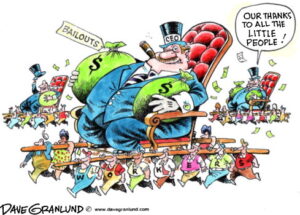I never thought I’d see the day that having a Facebook profile would be a crime. It’s slightly hysterical.
A new bill called “Facebook Felon” is working its way through South Carolina legislature these next few weeks, and soon the bill will work its way from coast to coast. The bill essentially states that prisoners, while behind bars, cannot use any sort of social networking site, like Facebook and Twitter. If they do, then a stiff $500 fine and at least 30 more days in prison could be stacked onto their already heavy sentences. Some claim it will trample on the prisoners First Amendment rights, while others (re)state the obvious, “They’re prisoners, how many rights should they have?” Granted, basic living conditions and not being beaten by the guards or each other should be inherent in a prisoner’s treatment. But where should the line be drawn? At Facebook? That’s what it’s come to in many States now. Facebook is the new battle ground for prisoner’s rights.
As absurd as it is by itself—focusing on social networking sites in prisons—it gets even better. Margaret Winter, associate director of the ACLU’s National Prison Project, has made certain parallels between Martin Luther King Jr.’s “Letters from a Birmingham Jail” to the status updates being made by some of the prisoners. While I’ll let you be the judge of such a statement, I’m inclined to believe otherwise. While MLK’s letters were written behind bars and were a form of prisoner communication, they will never be the same as making a status message on your Twitter account. I don’t believe I should even have to argue such a gross manipulation of the definition of prisoner communication that Ms. Winter has made. But it should be said. The intentions of the two are entirely different, both in context and meaning. First off, what Ms. Winter seems to be forgetting is that MLK was in the middle of the Civil Rights Movement and was wrongly imprisoned. Most, not all, of the prisoners in the system as of today are not fighting as noble a cause as MLK. Secondly, the letters were a response to many white clergymen’s “wait-and-see” attitude about the social injustices of the time. Martin Luther King Jr.’s nonviolent civil disobedience can equated with the likes of Gandhi, Henry David Thoreau, and Mother Theresa, not people who robbed a liquor store, got hold of the new iPhone 4 and tweeted their homeboys that they got pinched by some bacon. Ms. Winter’s statements have clearly demonstrated that while our cause may be noble, we should not make unwarranted statements that can be easily torn apart by third-grade logic.
“So what”, you may be asking, “is the problem?” Why has the use of social networking sites by prisoners become such a problem? Well, it’s been a problem for quite some time. The recent proliferation of smart phones have merely amplified the effect of these sites. Many guards and prisoners are smuggling in smart phones to sell through the proverbial grape vine of the prison system for upwards of ten times what they’re actually worth outside of prison. It was bad enough when contraband just meant cigarettes, alcohol, and other assorted and colorful drugs, now it’s come to be technology as well. With these new technologies that have made the internet easier and easier to access, prisoners have started to create and/or maintain their accounts on Facebook and Twitter. The main problem which has garnished the topic so much attention, is that many of these prisoners have been contacting and even intimidating their victims and witnesses, organizing hits and executions of more crimes on the outside and other typical prisoner things.
The problems that the “Facebook Felon” bill will come across is the 2003 federal court decision in Arizona, in which the judge stated that while a prisoner’s right to use the internet could be regulated, such prohibition did not extend to proxies. And, as per usual, technology has progressed faster than the law. These smart phones act as proxies because of various technicalities in the makeup of the phones. The only problem though, is that prisoners were never allowed their own phones in the first place. If they didn’t have the phones, then they wouldn’t have the technology to connect to the internet by proxy. Perhaps these law makers and arbiters should spend less time focusing on the effect of a specific site and stick with a larger issue. It is truly too big of a task to regulate whether or not a prisoner just updated his status (especially if they’re using a pseudonym), but it’s much easier to ensure that they don’t have the technology that enables them to do so.
The other issue is the guards. While part of the smuggling comes from prisoners and their visitors, it’s primarily the guards bringing these smart phones in. Be it because their salary is insufficient, or because they’re just plain greedy and sadistic, many guards are smuggling the phones in for the money. This isn’t something entirely new. Ten years ago the guards might’ve been more likely to smuggle in cigarettes or heroin, nothing’s actually changed. The surface of the cycle is the only thing that has changed. And this bill, purely focused on the surface of the issue, will only scratch at it…fruitlessly.
But then again, maybe it will affect some change. The topic could easily be argued either way, for or against the bill. So, what’s your view?
Facebook Prisoners,





Johnny
2 Apr 2011If the prisoners continue to use social networking sites to organize more crime, intimidate witnesses and victims, etc… Then there’s gotta be an end to their use of these privileges. It sounds like it’s going to be tough to regulate when you have guards smuggling the merchandise in for the prisoners.